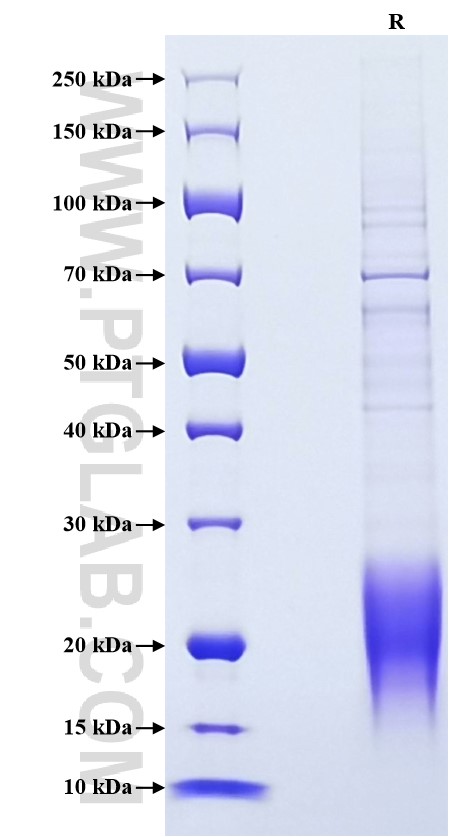Recombinant Human BNP protein (His Tag)
种属
Human
纯度
>90 %, SDS-PAGE
标签
His Tag
生物活性
未测试
验证数据展示
产品信息
| 纯度 | >90 %, SDS-PAGE |
| 内毒素 | <0.1 EU/μg protein, LAL method |
| 生物活性 |
Not tested |
| 来源 | HEK293-derived Human BNP protein His27-His134 (Accession# P16860) with a his tag at the N-terminus. |
| 基因ID | 4879 |
| 蛋白编号 | P16860 |
| 预测分子量 | 13.0 kDa |
| SDS-PAGE | 16-26 kDa, reducing (R) conditions |
| 组分 | Lyophilized from 0.22 μm filtered solution in PBS, pH 7.4. Normally 5% trehalose and 5% mannitol are added as protectants before lyophilization. |
| 复溶 | Briefly centrifuge the tube before opening. Reconstitute at 0.1-0.5 mg/mL in sterile water. |
| 储存条件 |
It is recommended that the protein be aliquoted for optimal storage. Avoid repeated freeze-thaw cycles.
|
| 运输条件 | The product is shipped at ambient temperature. Upon receipt, store it immediately at the recommended temperature. |
背景信息
NPPB, also known as B-type natriuretic peptide (BNP), is a cardiac hormone that is secreted mainly in the ventricles in response to increased wall stress. The protein undergoes two cleavage events, one within the cell and a second after secretion into the blood. The protein's biological actions include natriuresis, diuresis, vasorelaxation, inhibition of renin and aldosterone secretion, and a key role in cardiovascular homeostasis. BNP is a marker of systolic and diastolic dysfunction and a strong predictor of mortality in heart failure patients.
参考文献:
1. K J Koller, et al. (1991) Science. 252(5002):120-3. 2. Denise M Heublein, et al. (2007) Hypertension. 49(5):1114-9. 3. Brenda K Huntley, et al. (2015) Circ Heart Fail. 8(1):89-97.
